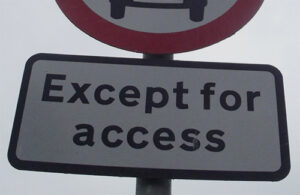Associations and institutions are welcome to apply to become members of the ALCC.
It may seem like everything is an infringement but it is important to know when you can make use of copyright material without infringing on the copyright owner’s rights.

There are some ways you can use copyright material without permission.
Photo: Sarah Reid. CC BY 2.0. Full attribution information below.
There are three main ways you might be able to use copyright material without the permission of the copyright owner. These are where:
- you are only making use of an insubstantial part of the copyright material
- you have a licence to use the material in the way you intend to use it (i.e. you already have permission) or
- your use is permitted under an exception to copyright.
The information on this gives an introduction to each scenario.
Use of an insubstantial part

Use of an insubstantial part of copyright material isn’t an infringement.
Photo: woodleywonderworks. CC BY 2.0. Full attribution information below.
Under the Copyright Act the use of all or a substantial part of copyright protected material is an infringement. As a result, the use of an insubstantial part is not. But determining what is a substantial part is tricky.
There is no definition of ‘substantial part’ but it has relates to the quality of what is used rather than the quantity. There is no magic percentage that is insubstantial; the courts have refused to prescribe a proportion amounting to a substantial part, relying rather on whether the part used was an ‘essential’, ‘vital’ or ‘material’ part. Generally, if the material is distinct enough for someone to want to use it, it will like be considered substantial. Unfortunately, this makes it very hard to rely on a defence of insubstantial part.
The insubstantial part rule is only helpful if you don’t need to reproduced the material as a whole. In practice libraries and archives are very often going to want to use the whole of the material (e.g. preserve it in its entirety or make a complete copy available for people to view online).
This is where copyright licensing and copyright exceptions come in.
Uses permitted by a licence

Licenses are a common part of how copyright works.
Photo: Blogtrepreneur/howtostartablogonline.net. CC BY 2.0. Full attribution information below.
Copyright licensing is one way to use material without infringing. You don’t have to ask permission because you already have been granted permission.
Typically a licence is a contract that grants a permission given by a copyright owner to a third party to use the copyright owner’s copyright material on specified terms.
Typically the copyright owner grants the third party a permission using an assignment or a licence. It is worth noting that an assignment transfers copyright interests to a third party which then owns the copyright and can assert the rights associated with that copyright. By licensing copyright, the copyright owner allows the third party to exercise some or all of their rights as the copyright owner.
You can do anything you have permission to do through a copyright licence. If you have a licence to use the material from the copyright owner, and your use is within the scope of the licence, then you have not infringed copyright. The good thing about licences is that you don’t have to know the law – you just have to follow directions. Our information on copyright licensing provides more comprehensive information about copyright licences.
Uses permitted by a statutory licence

Statutory licences are a form of blanket licence set out in the Copyright Act.
Photo: Feral Arts. CC BY 2.0. Full attribution information below.
Statutory licences are set out in the Copyright Act and allow material to be used without asking the copyright owner. But they are also like licences in that require you follow certain steps and pay remuneration. This money is provided to a copyright collecting society, which then distributes it to the creators. There are statutory licences in Australia for education, government and music.
You can find more information about statutory licences in our Copyright Guide.
Uses permitted under an exception

Exceptions are an important part of the copyright system.
Photo: Elliott Brown. CC BY 2.0. Full attribution information below.
If you don’t have permission to use copyright protected material there may be an exception that allows use without infringement. Exceptions set out certain uses or categories of uses that can be done without the copyright owner’s permission or payment, because it is in the public interest. Often they relate to certain categories of users, such as people with a disability, or teachers. The most well-known group of copyright exceptions are referred to as fair dealing but there are lots of exceptions in the Copyright Act, but there are also a lot of exceptions that are specific to libraries and archives. Our information on exceptions to copyright provides a more comprehensive overview of some of the exceptions.
